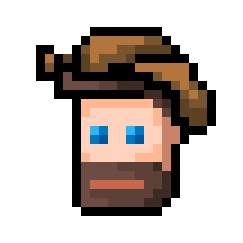
Hello! I'm Scott and I'm a professional dilettante.
Games
Most recently I've been learning pico-8. Here are some projects so far:
As part of 2022 7D FPS jam, I made Hookshot, a mobility-focused arena FPS, which is a fancy way of saying deathmatch with grappling hooks. I'm really pleased with how it turned out, and I hope to continue iterating on it. Hookshot is my first 3D game using Godot.
While learning the Godot engine, I made a game called Backwords. It is a take on Wordle, where you start with a solution word and try to create valid guesses given kinds of letter-use constraints that might come up in a Wordle run. Rather than minimize the number of guesses, you're trying to maximize the score of each word using Scrabble-style scoring. This change leads to a much wider variety of scores and outcomes, which was one of my design goals. You can play it here!
From 2012 to 2022, I worked off-and-on on a web-based game engine and editor. The engine used a novel programming language developed in tandem, featured custom graphics and sound editors, and integrated rollback-based multiplayer that required very little effort to take advantage of. Essentially, every game was also a multiplayer game. Initially called 1dash1, I eventually rebranded the project to miniboss.gg. Either way, the site no longer exists but the experience building it was invaluable and, to this day, it is the project I am most proud of.
Career
For a long time, roughly 2006-2022, I was a professional software developer, with some time in there as an ABD Ph.D. student. I worked in a variety of areas, including gaming, crypto (I know, I know), operations, and big web sites. You can find my resume here, though I don't really intend to return to that kind of work. If you have a project or opportunity that might be a good fit, do email.
Research
At Ph.D. school, I worked on two research projects: one exploring programming lanuages and developer tools for folks who are not professional developers but have a need for computation, and another that looked at adding human feedback to system optimization decisions. Both projects relied on data gathered via user research studies, which was somewhat unusual for that sort of study - at least the systems-focused work, although you'd be surprised how few novel programming tools measured their efficacy with human feedback.
Elsewhere
I sometimes toot at @cowboyscott@mastodon.gamedev.place
You can email me at me@cowboyscott.gg
Hosted on neocities. Go make yourself a website!